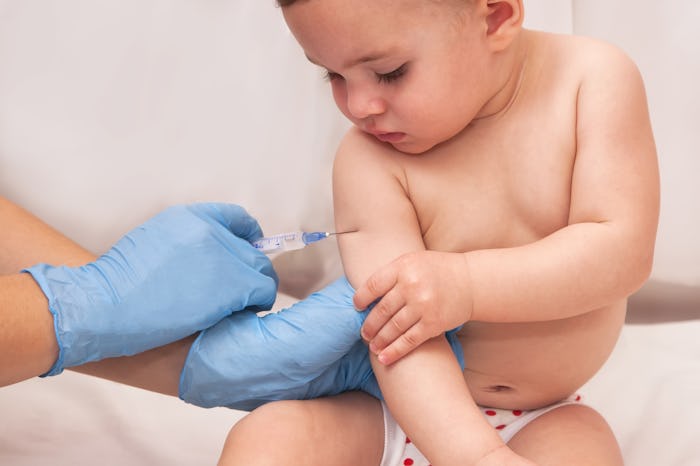The issue of vaccinating babies is a bit of a hot button topic, with most people valuing and adhering to the recommended schedule of vaccines, but others expressing concern about the number, frequency, and safety of these routine shots. All of these parents come to the topic wanting the best for their children and wanting to do everything they can to protect them and keep them healthy. If you decide against vaccines or to a limited number of them, it's important to consider how not vaccinating kids can affect them later in life.
The American Academy of Pediatrics (AAP) "strongly endorses universal immunization" and for good reason. "Vaccination against an array of infectious agents, such as polio, small pox, measles, haemophilus influenza b, among others, have been some of the greatest advances of modern medicine," Dr. Carlos Salama, an infectious disease specialist who is an Associate Professor of Medicine at the Icahn School of Medicine in New York tells Romper. "These vaccines have saved millions of lives all over the world. Although there are side effects associated with vaccinations, in general, these are vastly outweighed by their benefits of preventing disease and saving lives. Scientific evidence is firmly on the side of vaccinating children against preventable disease such as measles, mumps, rubella, polio, diphtheria, pertussis, tetanus and many other diseases."
The medical community feels strongly you should not only vaccinate your children, but do it in concert with the AAP recommended vaccination schedule. Of course, parents have the right to decide which path to pursue, and for some, it's a difficult decision to make. In case you're still trying to figure it out, or on the fence, here are some things to keep in mind.
1They may have trouble enrolling them in school
In order to maintain public health safety, states each have laws for which vaccinations are required for public school entrance. States can determine whether they will allow medical, religious, and/or philosophical exemptions and each state has procedures in place to receive these exemptions. The Centers for Disease Control (CDC) has a summary of state-by-state vaccination exemptions. If your decision does not fall within your state's exemption policy, your child will not be allowed to attend public school.
2They may have trouble staying in school (if there's an outbreak)
This also varies state-to-state. In New York, for example, if your child is allowed to enroll in public school and there is an outbreak in your community of a disease that your child has not been immunized for, you may be asked to take your child out of school and related events, explained the New York State Department of Health's site.
3They're vulnerable to the diseases the vaccines are designed to prevent
This is obvious, but still worth mentioning. Parents of Kids With Infectious Disease explained that "without vaccines, epidemics of vaccine-preventable diseases would return." Take Polio for instance. Before a vaccine was introduced, there were 13,000 to 20,000 cases paralytic poliomyelitis reported each year just in the United States. A global effort was made to eliminate the disease and in 1996 there were only 3,500 cases around the world. Today, "wild polioviruses have been eliminated in the entire Western Hemisphere."
4"Herd immunity" is disrupted
Immunizing your child also protects new babies and children (like their friends or classmates) who can't be immunized themselves, because it reduces incidence of the disease (aka "herd immunity"). In an interview with Romper, Dr. Ken Feuerstein, a pediatrician in New York, warns it's more likely someone who isn't immunized themselves will not immunize their children and this could result in higher and higher proportions of the population not receiving vaccinations, precipitating a return of previously eradicated or greatly reduced diseases such as small pox and polio. Babies don't get immunizations right away and there are many children who, due to ongoing health issues such as cardiomyopathy, cancer, or being immunocompromised, can't receive immunizations. These children rely on the herd immunity, and are at high risk of contracting viruses and diseases.
5They may have trouble seeing a doctor
Many pediatricians (including the pediatrician my kids went to when they were babies) choose not to include families who decide not to vaccinate their kids. As my then-pediatrician told me, she was concerned that if the parents were questioning the vaccination recommendation due to research they had done on their own, they could also likely question advice in other areas (particularly in an emergency) and prevent the doctor from providing optimal care.
Dr. Feuerstein also echoed he had many colleagues who don't allow non-vaccinated children in their practice, particularly because unvaccinated children have a higher likelihood of getting infectious diseases, and the doctors don't want to potentially expose their other patients to them.
6They must know and disclose their vaccine status to any medical personnel they are seen by
The Centers for Disease Control (CDC) recommended you tell any medical personnel your child comes in contact with that they have not received all or some of their vaccines. This includes emergency room visits, 911 calls and visits to a doctor who is not your usual practitioner. This is for two important reasons. One, "the doctor will need to consider the possibility that your child has a vaccine-preventable disease," the CDC explained. And two, depending on your child's symptoms, the staff may need to isolate your child away from anyone who is at high-risk of contracting whatever your child may be carrying (for example, infants).
Check out Romper's new video series, Bearing The Motherload, where disagreeing parents from different sides of an issue sit down with a mediator and talk about how to support (and not judge) each other’s parenting perspectives. New episodes air Mondays on Facebook.
